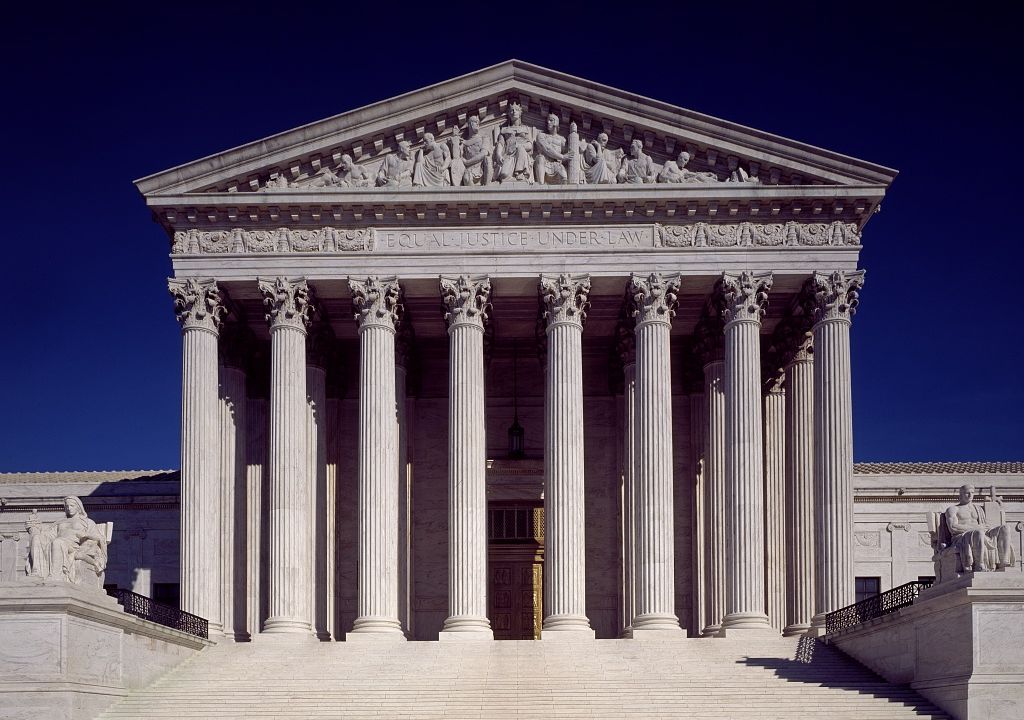
A view of the Supreme Court Building, with "Equal Justice Under the Law" inscribed on its pediment. (Photo by Carol Highsmith, 1980, Library of Congress)
President Trump has a great opportunity to determine the character of the federal bench. Because the Senate only confirmed 20 of Obama’s nominees during his last two years in office, (less than a third of the number confirmed during the last two years of Reagan, Clinton and George W. Bush) he has a slew of vacancies to fill. He’s not been fast off the block filling those 130 vacancies. He nominated a handful of candidates in early May and those picks are facing confirmation hearings this month.
Things aren’t going quite as planned for two of them. John Bush, a 52-year-old 6th Circuit nominee from Kentucky, and Damien Schiff, a 37-year-old nominee for the US Court of Federal Claims from California, made headlines when they were quizzed about their social media presences. What the president is to Twitter — these guys are to blogging in the Senate.
Slate’s Dahlia Lithwick lays out the questionable posts in detail:
Schiff, an attorney at the Pacific Legal Foundation, has a sideline as a blogger. In a 2007 post on his personal blog, he wrote, “It would seem that Justice [Anthony] Kennedy is (and please excuse the language) a judicial prostitute, ‘selling’ his vote as it were to four other Justices in exchange for the high that comes from aggrandizement of power and influence, and the blandishments of the fawning media and legal academy.”
In 2009, Schiff railed against the anti-bullying program in a California school district: “I have not seen the proposed lesson, but … it seems to teach not only that bullying of homosexuals is wrong, but also that the homosexual lifestyle is … good, and that homosexual families are the moral equivalent of traditional heterosexual families.” Schiff then added: “Perhaps someone will respond: would you have objected to an anti-racism curriculum being taught in 1950s Arkansas? I guess my answer there would be a qualified yes, that I would have objected, not that I would approve of racism, but that, as a prudential matter, the best way to get people to drop their racist views would not be to force the teaching of their children.”
Then there is Bush, who is becoming a familiar type in the fake news era. Blogging under a pseudonym, the Kentucky lawyer wrote more than 400 posts for the website Elephants in the Bluegrass. His wide-ranging and unfiltered commentary has included, for instance, the claim that abortion and slavery are “[t]he two greatest tragedies in our country.” His blog posts have cited conspiracy theories and false information, including references to the claim that President Obama was not born in the United States. In his Senate questionnaire, he described the vicious 1991 beating of Rodney King as a “police encounter.” As Eleanor Clift notes in The Daily Beast, he has also gone on record arguing that the Supreme Court made a bad ruling in the landmark freedom of the press case New York Times Co. v. Sullivan. In the Trump era, that’s a feature, not a bug.
But the real drama lies in the Q&A of the hearings. NPR’s Nina Totenberg has a fuller rundown (with audio) in “The Case of the Bloviating Bloggers.” Bush, she notes, said he regretted some of his posts, but that none of the views he expressed online would affect his judicial decision making. An exchange on Roe v. Wade prompted Sen. Feinstein to remind him that he was under oath. Sen. Franken questioned Bush about certain “alt-right” conspiracy tainted posts:
In a testy exchange, Franken pressed Bush on how he decided which sources to rely on for information, pointing to one source which Franken called a “white nationalism” propaganda organ filled with “hate speech.”
Bush dodged the question several times, until Franken asked bluntly if Bush “felt free to put posts out that cited sources that you knew were not credible.”
“No,” Bush replied. “I’m not saying that. I’m saying that as a blogger, I was making political statements.”
Damien Schiff, says Totenberg, was far more confrontational, especially about his post that called Supreme Court Justice Anthony Kennedy a “judicial prostitute.”
Find more coverage of the confirmation hearings of these two and other judicial nominees at Politico and a view from the other side of the aisle at The Washington Examiner.



